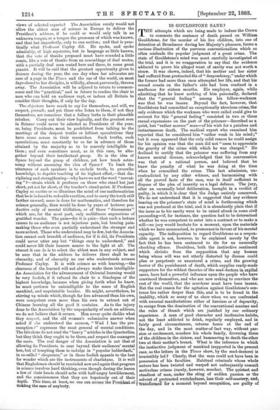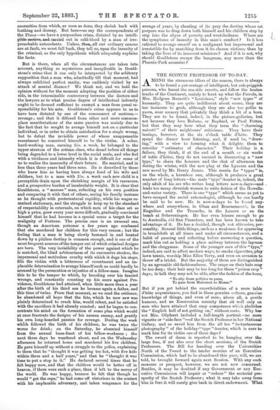IS GOULDSTONE SANE 1 3 T HE attempts which are being made
to induce the Crown to commute the sentence of death passed on William Gouldstone, for the murder of his five children, into one of detention at Breadmoer during her Majesty's pleasure, forms a curious illustration of the perverse conventionalism which so often misleads the popular judgment of a great crime. The state of Gouldstone's mind was most carefully investigated at the trial, and it is no exaggeration to say that the evidence adduced to prove his alleged want of sanity was not worth a straw. It was shown, indeed, that his mother and her sister had suffered from protracted fits of " despondency," under which the former had more than once attempted her life, and that his second cousin on the father's side had been confined in a madhouse for sixteen months. His employer, again, while admitting that he knew nothing of him personally, declared that the "general feeling" among hia fellow-workmen was that he was insane. Beyond the fact, however, that Gouldstone had committed an exceptionally atrocious crime, the only evidence which the workmen who were called could give to
account for this "general feeling" consisted in two or three casual expressions on the part of the prisoner—described as a quiet, but "rather morose" man—of his wish for a painless and instantaneous death. The medical expert who examined him reported that he considered him "rather weak in his mind ;" but it soon appeared that the only solid reason he could assign for his opinion was that the man did not "seem to appreciate the gravity of the crime with which he was charged." He declined to certify that the prisoner was suffering from any known mental disease, acknowledged that his conversation
was that of a rational person, and believed that he knew the penalty of what he was doing at the time when he committed the crime. This last admission, un- contradicted by any other witness, and harmonising with all the proved facts of the case, was in itself sufficient to dispose of the plea of insanity as a legal defence. The jury, after an unusually brief deliberation, brought in a verdict of guilty, in which it is clear that the Judge entirely concurred. We do not understand that it is suggested that any evidence bearing on the prisoner's state of mind is forthcoming which was not produced at the trial, and it is abundantly plain that if the issue as to his sanity were to be raised afresh in some civil proceeding—if, for instance, the question had to be determined whether he was competent to enter into a contract or to make a will—no jury would hesitate for a moment, upon the materials which we have summarised, to pronounce in favour of his mental capacity. The indisposition to regard Gouldstone as a respon- sible agent is not, however, to be explained merely by the fact that he has been sentenced to die for an unusually shocking offence. Doubtless, both the instinctive sentiment which shrinks from the supposition that any human being -whose will was not utterly distorted by disease could. planor perpetrate so unnatural a crime, and the growing horror of the punishment of death, which supplies ready-made supporters for the wildest theories of the mad-doctors in capital cases, have had a powerful influence upon the people who have convinced themselves, and who are now seeking to convince the rest of the world, that the murderer must have been insane. But the real reason for the agitation against Gonldstone's sen- tence lies rather deeper than this, and is to be found in the inability, which so many of us show when we are confronted with unusual manifestations either of heroism or of depravity, to escape from the domination of the conventional maxims and. the rules of thumb which are justified by our ordinary experience. A man of good character and inoffensive habits, not the least addicted to drink, regularly employed, and in fairly good circumstances, returns home at the end of the day, and in the most matter-of-fact way, without pas- sion or excitement, murders his whole family, drowning three of the children in the cistern, and hammering to death the other two at their mother's breast. What is the inference to which the instinctive judgment of mankind (supported in the present case, as the letters in the Times show, by the mad-doctors) is irresistibly led ? Clearly, that the man could not have been in possession of his faculties. Habitual criminals whose whole nature has been twisted and warped not unfrequently commit motiveless crimes (rarely, however, murder). The quietest and. steadiest of men, under the sting of sudden passion or the
solvent of protracted wretchednees, loseItaeir-eelf-mastery; and, _
-transform- id- for a moment beyond recognition, are guilty of enormities from which, as soon as done, they shrink back with loathing and dismay. But here—so say the correspondents of the Times—we have a purposeless crime, dictated by no intelli- gible motive, and aarrilvi out in cold-blood by a man of irre- proachable antecedents. -Unless, then,, all our ordinary canons are at fault, we must fall back, they tell us, upon the insanity of the criminal, as the only hypothesis which adequately explains the facts.
But is there, when all the circumstances are taken into account, anything so mysterious and inexplicable in Gould- stone's crime that it can only be interpreted by the arbitrary supposition that a man who, admittedly till that moment, had always exhibited perfect sanity, was suddenly visited by an attack of mental disease ? We think not, and we hold the opinion without for the moment adopting the position of either side, in the interminable controversy between the doctors and the lawyers as to what precise degree of intellectual infirmity ought to be deemed sufficient to exempt a man from penal re- sponsibility for his acts. Gonldstone's crime appears to us to have been dictated by one of the commonest of motives,— revenge ; and that it differed from other and more common- place manifestations of the same passion was mainly due to the fact that he sought to avenge himself not on a particular individual, or in order to obtain satisfaction for a single wrong, but to defeat the invisible power of whose unappeasable resentment he conceived himself to be the victim. A sober, hard-working man, earning 25s. a week, he belonged to the upper stratum of the artisan class, who dread before all things being degraded to a lower level in the social scale, and who feel with a vividness and intensity which it is difficult for some of us to realise the insecurity of their future. He married, and in less than three years had three sons. He is described by those who knew him as having been always fond of his wife and children, but to a man with 25s. a week each new child is a perceptible drain upon the shrinking margin of his resources, and a prospective burden of incalculable weight. It is clear that Gouldstone, a " morose " man, reflecting on his own position and comparing it with that of others, seeing his family increase as he thought with preternatural rapidity, while his wages re- mained stationary, and the struggle to keep up to the standard of respectability in externals, on which men of his class set so high a price, grew every year more difficult, gradually convinced himself that he had become in a special sense a target for the malignity of Fortune. The precise case is an unusual one, though an American poisoner a few years ago confessed that she murdered her children for this very reason ; but the feeling that a man is being slowly hemmed in and hunted down by a pitiless destiny is common enough, and is one of the most frequent sources of the temper out of which criminal designs are born. The very invisibility of the power against which he is matched, the blind arbitrariness of its successive strokes, the impersonal and motiveless cruelty with which it dogs his steps, fills the victim with a bitterness of resentment and an im- placable determination to avenge himself such as could hardly be aroused by the persecution or injustice of a fellow-man. Imagine this to be the temper to which, by brooding over his fancied wrongs, and constantly counting up his score against Pro- vidence, Grouldstone had attained, when little more than a year after the birth of his third eon he became again a father, and this time of twins. From that moment, as we read the evidence, he abandoned all hope that the fate, which he now saw was plainly determined to crush him, would relent, and be satisfied with the sacrifices it had already exacted; and he began to con- centrate his mind on the formation of some plan which would at once frustrate the designs of' his unseen enemy, and gratify his own long-hoarded passion for revenge. During the week which followed the birth of his children, he was twice the worse for drink ; on the Saturday, he absented himself from the annual bean-feast of his fellow-workmen ; the next three days he wandered about, and on the Wednesday afternoon he returned home and murdered his five children. He gave himself up without a struggle to the police, explaining to them that he "thought it was getting too hot, with five kids within three and a half years," and that he "thought it was time to put a stop to it." He declared several times that he felt happy now, and that the children would be better off in heaven, if there were such a place, than if left to the mercy of the world. He was happy, because he felt that though he would " get the rope," he had come off victorious in the contest with his implacable adversary, and taken vengeance for the
wrongs of years, by cheating of its prey the destiny whose set purpose was to drag down both himself and his children step by step into the abyss of poverty and wretchedness. Where are the symptoms of insanity in this man's conduct ? Is it less rational to avenge oneself on a malignant but impersonal and irresistible foe by snatching from it its chosen victimsp than by taking the lives of its innocent ministers P And if it is not, why should Gouldstone escape the hangman, any more than the Phoonix-Park assassins ?



































 Previous page
Previous page